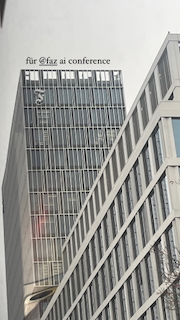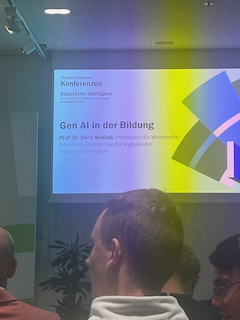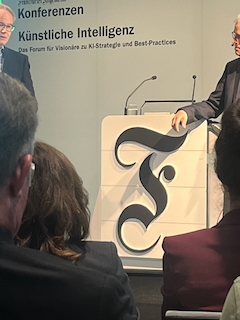The AI Race, Media Disruption, and What’s Next—Lessons from FAZ’s Conference on Innovation and Impact
- Johanna Weiermann

- Nov 11, 2024
- 2 min read
Updated: Jul 16
The Frankfurter Allgemeine Zeitung (FAZ), one of Germany’s leading newspapers renowned for its in-depth journalism and analysis, hosted a high-profile conference in Frankfurt, bringing together global AI experts, policymakers, and industry leaders.
This event served as a critical forum for discussing the latest breakthroughs in artificial intelligence and their impact on media, business, and society. As an educator at the Akademie für KI und Digitalisierung, I had the opportunity to attend alongside Lukas Görög, the academy’s founder.
Over the course of the event, we engaged with cutting-edge research and thought-provoking discussions that underscored the rapidly evolving AI landscape and its far-reaching implications.
Key Insights: A Shifting AI Landscape
1. How AI Media Innovation is Reshaping Education
Doris Weßels (Hochschule für Angewandte Wissenschaften Kiel) advocated for AI-integrated education, moving beyond concerns about student misuse to embracing AI-driven learning. Her stance resonated with Ethan Mollick’s concept of "Post-Apocalyptic Education," where AI integration is inevitable, and the real challenge lies in preparing educators to navigate this transformation. A striking takeaway: "The real revolution is in how educators themselves learn."
2. Germany’s AI Dilemma: Talent Drain vs. Robotics Strength
Jürgen Schmidhuber (KAUST Generative AI Center) highlighted Germany’s AI talent drain to the U.S. but noted an opportunity in robotics, where Germany’s strong mechanical engineering sector could be a global leader.
3. Generative AI and Media Innovation: Who Wins & Who Loses?
Holger Schmidt from FAZ presented compelling insights into how generative AI is reshaping business models. His analysis outlined clear winners and disruptors across industries, from legal services and journalism to marketing and software development. He emphasized that generative AI is not just a productivity tool but a fundamental competitive force.
Looking Ahead: How This Trip Will Shape My Work
Reflecting on this experience, several themes will directly impact my work moving forward:
Strategic AI Adoption in Education: The shift from rule-based AI restrictions to AI-driven learning methodologies will shape how I approach digital education strategies. Integrating AI tools into training programs could enhance both engagement and effectiveness of the education I deliver.
Business Transformation Through AI: Lessons from robotics and AI’s economic impact will inform digital strategies, further enhancing my consulting by providing deeper insights into AI-driven business models and transformation opportunities.
The Human-AI Collaboration Shift: As AI takes on more complex tasks, human oversight shifts from control to strategy. This requires rethinking workflows and ethics to harness AI’s benefits while mitigating risks. Applying these insights will develop new strategies for integrating AI into newsroom workflows, optimizing efficiency while fostering creativity.
Conclusion: A Catalyst for Future Innovation
Frankfurt was not just a conference stop; it was a convergence of ideas that will shape how I think about AI’s role in education, business, and leadership. The accelerating pace of AI media innovation presents both challenges and opportunities, and as someone deeply involved in digital transformation, I see this as a moment to push boundaries, rethink strategies, and contribute to shaping an AI-powered future that is both innovative and responsible.
If you're interested in our approach to AI education and consulting at Akademie für KI, feel free to visit get in touch!.
PS: Here are some moments from the trip/event—sorry for the blurry shots, but the insights were crystal clear 👀










